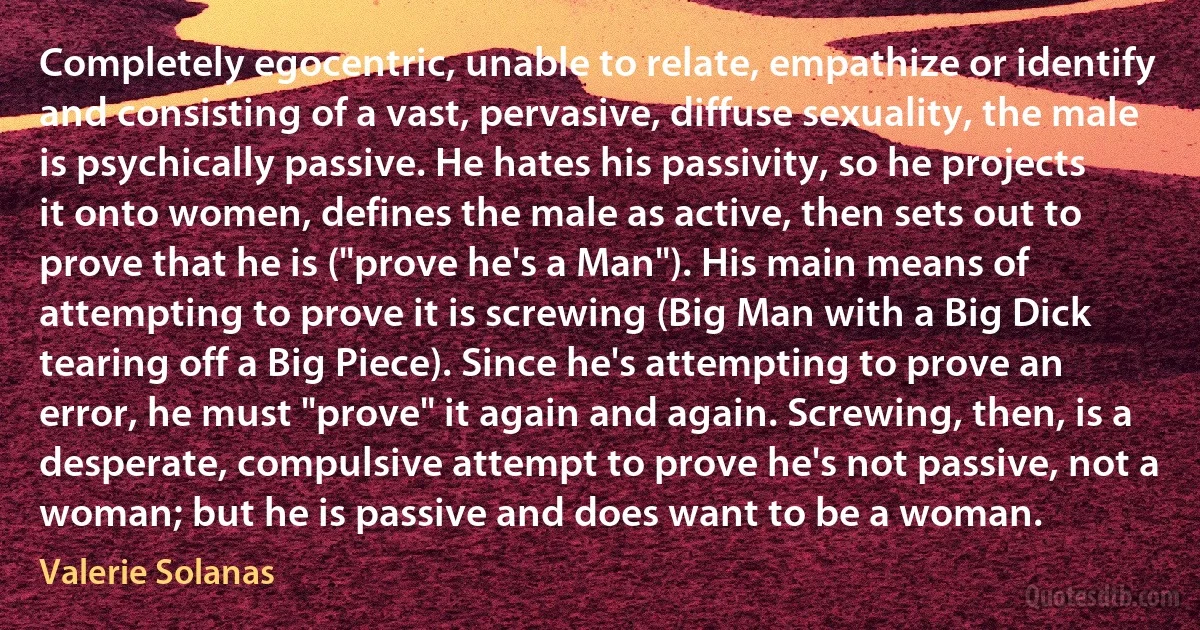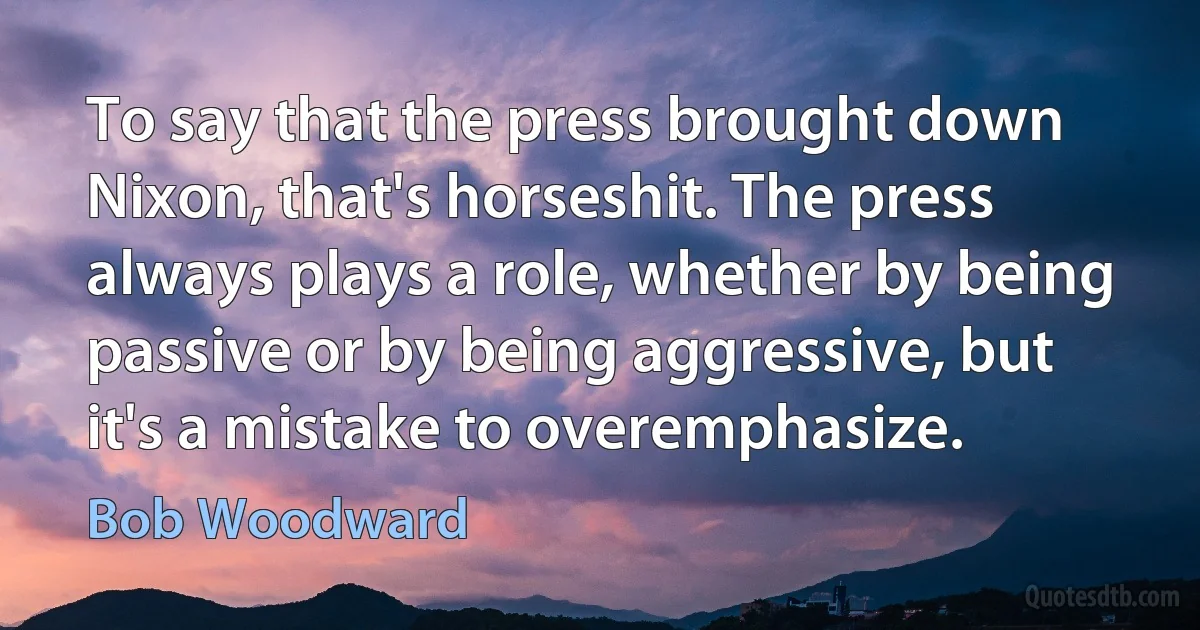Passive Quotes - page 13
We in Ghana, are committed to the building of an industrialized socialist society. We cannot afford to sit still and be mere passive onlookers. We must ourselves take part in the pursuit of scientific and technological research as a means of providing the basis for our socialist society, Socialism without science is void. ...

Kwame Nkrumah
The day becomes more solemn and serene When noon is past; there is a harmony In autumn, and a lustre in its sky, Which through the summer is not heard or seen, As if it could not be, as if it had not been! Thus let thy power, which like the truth Of nature on my passive youth Descended, to my onward life supply Its calm, to one who worships thee, And every form containing thee, Whom, SPIRIT fair, thy spells did bind To fear himself, and love all human kind.

Percy Bysshe Shelley
Being absolute, the supreme Principle is ipso facto infinite; the masculine body accentuates the first aspect, and the feminine body the second. On the basis of these two hypostatic aspects, the divine Principle is the source of all possible perfection; in other words, being the Absolute and the Infinite, It is necessarily also Perfection or the Good. Now each of the two bodies, the masculine and the feminine, manifests modes of perfection which their respective gender evokes by definition; indeed, all cosmic qualities are divided into two complementary groups: the rigorous and the gentle, the active and the passive, the contractive and the expansive. The human body is an image of Deliverance: now the liberating way maybe either "virile" or "feminine", although it is not possible to have a strict line of demarcation between the two modes, for man (homo, anthropos) is always man; the non-material being that was the primordial androgyne survives in each of us.

Frithjof Schuon
Our democracy, as Snowden I think has revealed, has become a fiction. The state, through elaborate forms of political theater, seeks to maintain this fiction to keep us passive. And if we wake up, the state will not shy away from draconian measures. The goal is complete subjugation, the iron rule of our corporations and our power elite.

Edward Snowden
Reading, in contrast to sitting before the screen, is not a purely passive exercise. The child, particularly one who reads a book dealing with real life, has nothing before it but the hieroglyphics of the printed page. Imagination must do the rest; and imagination is called upon to do it. Not so the television screen. Here everything is spelled out for the viewer, visually, in motion, and in all three dimensions. No effort of imagination is called upon for its enjoyment.

George F. Kennan
I cannot tell you what it does to me to hear pre-Stonewall. And even in our literature, even in the art, pre-Stonewall, post-Stonewall. I wrote three books pre-Stonewall and a dozen more post-Stonewall. There's no demarcation. Gay history is centuries and centuries from the Romans to the Greeks to Oscar Wilde to all kinds of outrages. And those seem to be put back and pre-Stonewall is passive. Post-Stonewall is brave and dignified. I actually have heard things like that...

John Rechy
The essence of
MAGICK
is simple enough in all conscience. It is not otherwise with the art of government. The Aim is simply prosperity; but the theory is tangled, and the practice beset with briars.
In the same way
MAGICK
is merely to be and to do. I should add: "to suffer". For Magick is the verb; and it is part of the Training to use the passive voice. This is, however, a matter of Initiation rather than of Magick in its ordinary sense. It is not my fault if being is baffling, and doing desperate!

Aleister Crowley
The thing about Kaballah, the thing about spirituality is that it's your responsibility as a spiritual person to be honest. Sometimes being honest is calling somebody on their bullshit and not standing there and being passive and letting somebody self-destruct. Being spiritual doesn't mean going, `Aw, honey, aw, poor baby' . That's not being spiritual. When somebody needs a kick in the pants, you say get your shit together, asshole. If that's what the situation requires, then that's being spiritual. If laying back and saying nothing is appropriate, that's being spiritual. It's really being completely conscious of each situation, whether it's friendships, whether it's with the world. Since I'm a performer, I have a bigger responsibility to be honest for each situation. It's not in any way counter to my spirituality, au contraire.

Sandra Bernhard
The spectacle manifests itself as an enormous positivity, out of reach and beyond dispute. All it says is: "Everything that appears is good; whatever is good will appear." The attitude that is demands in principle is the same passive acceptance that it has already secured by means of its seeming incontrovertibly, and indeed by its monopolization of the realm of appearances.

Guy Debord
But to poetry - You have to be willing to waste time. When you start a poem, stay with it and suffer through it and just think about nothing, not even the poem. Just be there. It's more of a prayerful state than writing the novels is. A lot of the novel is in doing good works, as it were, not praying. And the prayerful state is just being passive with it, mumbling, being around there, lying on the grass, going swimming, you see. Even getting drunk. Get drunk prayerfully, though.

Robert Penn Warren
The true value of a man is not determined by his possession, supposed or real, of Truth, but rather by his sincere exertion to get to the Truth. It is not possession of the Truth, but rather the pursuit of Truth by which he extends his powers and in which his ever-growing perfectibility is to be found. Possession makes one passive, indolent, and proud. If God were to hold all Truth concealed in his right hand, and in his left only the steady and diligent drive for Truth, albeit with the proviso that I would always and forever err in the process, and offer me the choice, I would with all humility take the left hand, and say: Father, I will take this one-the pure Truth is for You alone.

Gotthold Ephraim Lessing
True, the law is sacred to the bourgeois, for it is his own composition, enacted with his consent, and for his benefit and protection. He knows that, even if an individual law should injure him, the whole fabric protects his interests; and more than all, the sanctity of the law, the sacredness of order as established by the active will of one part of society, and the passive acceptance of the other, is the strongest support of his social position. Because the English bourgeois finds himself reproduced in his law, as he does in his God, the policeman's truncheon which, in a certain measure, is his own club, has for him a wonderfully soothing power. But for the working-man quite otherwise! The working-man knows too well, has learned from too oft-repeated experience, that the law is a rod which the bourgeois has prepared for him; and when he is not compelled to do so, he never appeals to the law.

Friedrich Engels
Life is a creative endeavor. It is active, not passive. We are the yeast that leavens our lives into rich, fully baked loaves. When we experience our lives as flat and lackluster, it is our consciousness that is at fault. We hold the inner key that turns our lives from thankless to fruitful. That key is "Blessing."

Julia Cameron
Many Britons...feel strongly about something which was once called "the alien wedge". And surely it cannot be doubted, even by those who profess allegiance to the "multicultural society", that our society, unlike America, is not of that kind, and therefore that immigration cannot be an object of merely passive contemplation on the part of the present citizenship. There is perhaps no greater sign of the strength of liberalism (a strength which issues, not from popular consensus, but from the political power of the liberal elite) than that it has made it impossible for any but the circumlocutory to argue that the English, the Scots and the Welsh have a prior claim to the benefits of the civilization that their ancestors created, which entitles them to reserve its benefits for themselves.

Roger Scruton
![Her Majesty's present Ministers have hitherto been enabled to secure that peace, so necessary to the welfare of all the civilized countries, and so peculiarly the interest of our own. But this ineffable blessing cannot be obtained by the passive principle of non-interference. Peace rests on the presence, not to say the ascendancy, of England in the Councils of Europe. ... May [the election] return to Westminster a Parliament not unworthy of the power of England and resolved to maintain it! (Benjamin Disraeli)](https://cdn.quotesdtb.com/img/quotes_images_webp/93/benjamin-disraeli-ascendancy-blessing-516393.webp)


